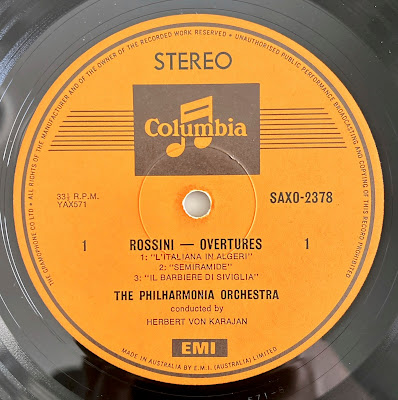Rossini Overtures from Serafin, Galliera, and Karajan
The opera overtures of Giaochino Rossini are some of the most charming, lighthearted, and humorous orchestral works of music from the 19th century. Fortunately, there are plenty of wonderful recordings of these works and many from the "golden age" of stereo. While we have previously covered one from Carlo Maria Giulini and the Philhamonia Orchestra (Columbia SAX 2560), here are a few others that I have recently across:
Rossini Ouvertures:
- La Gazza Ladra
- La Scala di Seta
- Guglielmo Tell
- Il Barbiere di Siviglia
- Temporale dal Barbiere di Siviglia
- Semiramide
Orchester der Römischen Oper
Tullio Serafin, conductor
Date published: 9/1964
Tullio Serafin (1878-1968) was one of the leading opera conductors of the 20th century who had quite a long and illustrious career. He is credited with helping to revive many of the Rossini operas and establishing them as staples of 20th century repertoire.
While I have found the sound of DG recordings on vinyl to be variable in quality, this one is an early one and on the better end of the spectrum to my ears. Overall, it's a pretty dynamic record. There is good clarity and balance and nice spatial separation and imaging of the orchestra sections. The presentation here is more up close and immediate, and there is a somewhat drier hall acoustic. The Orchestra of the Roman Opera plays with plenty of enthusiasm and vitality, and it just sounds like they are having a great time. An enjoyable listen.
Columbia SAXF 118
Ouvertures de Rossini:
- ,PhSémiramis
- Guillaume Tell
- L'Italienne a Alger
- L'Échelle de Soie (La Scala di Seta)
- La Pie Voleuse (La Gazza Ladra)
Philharmonia Orchestra
Alceo Galliera, conductor
Matrix numbers: YAX 366 21 / YAX 367 21 E
Next, we have a French Columbia stereo release from Alceo Galliera and the Philharmonia Orchestra. It took a little bit of effort to investigate the discography for this one. According to Discogs, Galliera and the Philharmonia released a monophonic disc of Rossini overtures on UK Columbia and US Angel in 1953. That album, however, had six overtures (as opposed to this disc with five), swapping Signor Bruschino and La Cenerentola for La Gazza Ladra, and is not from the same recording session as the one for this stereo release. According to Stephen Pettitt's Philharmonia Orchestra: Complete Discography 1945-1987 (Travis & Emery, 1987), Galliera re-recorded five Rossini overtures between May 15 and 28, 1959. Pettitt lists these sessions as "Columbia unpublished", but I think we can assume that they were released on French, but not UK, Columbia.
This recording boasts a nice and warm tube sound. In contrast with the Deutsche Grammophon recording above, the presentation here is more distant, like you are sitting in the rear of the hall. As far as the performance is concerned, the playing is perhaps more polished and polite than that in the Serafin recording above, but I found myself preferring the sheer energy and enthusiasm of the Orchestra of the Roman Opera.
Columbia SAXO 2378
Rossini Overtures
- L'Italiana in Algeri
- Semiramide
- Il Barbieri di Siviglia
- Guglielmo Tell
- La Scala di Seta
- La Gazza Ladra
Philharmonia Orchestra
Herbert von Karajan, conductor
Date published: 1961
Matrix numbers: YAX 571-8 / YAX 572-8
Our third recording is the Australian Columbia issue of UK Columbia SAX 2378 with the later orange magic notes label (Australian Columbia went straight from the blue/silver first label to this orange magic notes one). Here, we have Karajan conducting the Philharmonia, and to be honest, the performances sound somewhat similar to those of the Galliera recording. The sonic characteristics are also very similar, from the tube warmth to the more laid back presentation. This is Rossini heard from the back of the concert hall. I have a French Columbia SAXF stereo copy of this album with the same stamper numbers (-8/-8) that sounds just about the same as this one. According to Pettitt's complete Philharmonia discography, the dates on Karajan's recording session are March 26-27 and 29-30, 1960. Perhaps Galliera's recording described above was not released on UK Columbia to avoid competing with the Karajan disc?
The Stereo Record Guide, Volume 3 (Long Playing Record Library Ltd, 1963) says the following about this record: "Neither Dorati nor Karajan are particularly well recorded, but Karajan's somewhat turgid sound is to be preferred to the dry, lustreless, and bottom-heavy Mercury offering which varies from fair to poor. Dorati's deadpan performances compensate little but Karajan's readings have an expansive seriousness which produces some velvety orchestral tone, even if there is little sign of wit."
These are just a small sampling of the many great recordings out there of the Rossini overtures. A few other notable ones to consider include the following:
- Reiner/Chicago Symphony Orchestra (RCA LSC-2318)
- Maag/Paris Conservatoire Orchestra (Decca SXL 2182/London CS 6089)
- Gamba/London Symphony Orchestra (Decca SXL 2266/London CS 6204)
- Dorati/Minneapolis Symphony Orchestra (Mercury SR 90139).
That's it for Miles to Mozart this week. If you have your own favorite recordings of the Rossini Overtures, please share with us in the comments below. Happy listening!













A very nice post this one, and very intriguing. I have plenty of recordings of Rossini overtures (they are ubiquitous and cheap, so browsing at flea markets always yields a lot of interesting records). Beside the afforementioned Karajan and Serafin records (the former in mono, alas), I have the Reiner, Toscanini and Colin Davis, as well as several isolated ones in samplers by Solti, Dorati and God knows what else.
ReplyDeleteToday I only had the time to compare Serafin and Karajan. I found the Serafin far superior in the interpretation. It had humour, it was fun, the dancing rhythms in Gaza Ladra were perfectly played-I could close my eyes and imagine people dancing merrily to the music. Karajan on the other hand, was insensible, rigid, it all sounded bombastic, and loud, and hollow. No joy there, it could just as well had been the music for a military parade.
Dear Kostaszag,
DeleteIt's great to hear from you as always! I agree with you wholeheartedly about the Serafin vs Karajan. The Serafin recording is much more lively and amusing, which I think was what Rossini was aiming for. It's too bad that Karajan (and Galliera) weren't in the same spirit when they prepared their performances.
Although it's been a while, I remember listening to the Gamba wide-band Decca recording years ago, when I still owned it. Now that was a dynamic record!
The Gamba sounds tempting...Had the time to listen to two more recordings,the Reiner in Living Stereo and the Dorati on Mercury. The Reiner I have on a late Red Seal pressing with very thin vinyl. Stampers are A1/21S. It sounds magnificent, very straightforward and dynamic in-your-face sound, with lots of tight, crisp bass. The conducting is not playful or humorous -no one ever accused Fritz Reiner of having a sense of humour!-but it is virtuosic. It is like listening to the Heifetz of orchestras, playing with impeccable accuracy and speed, a different kind of fun than the Serafin but fun nonetheless!
DeleteThe Dorati I have on a French Philips-interestingly, it is mastered in France too. The sound is very nice and spacious and on the Thieving Magpie we have some nice sonic effects with the drum rolls in the beginning-the first one is placed front left, the second is way backstage on the right and the third is even further back in the middle of the stage. However when the tutii come the bass sounds muddy and less well defined. Perhaps this is a problem of the French edition. About the conducting, my first impression is that it is a bit indifferent, but I only could hear part of one overture, so I will give a final opinion on that point later.
Thank you for sharing your observations, Kostaszag! I had to laugh at your comment about Reiner and a sense of humor. I don't think I've ever seen a picture of him smiling.
DeleteI used to have a copy of the Dorati Rossini on Mercury, but I don't recall that one as being particularly noteworthy in terms of sound or performance. The Stereo Record Guide reviewer apparently didn't think very highly of the recording. If I find a cheap copy again, I'll report back.